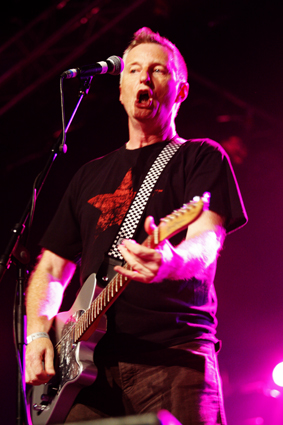Search
Toby Venables reports on Billy Bragg – Cambridge Folk Festival, 1 Aug 2008

Last time Billy Bragg performed at the Festival, it was with his band The Blokes, and a good time was had by all. This time around, he was performing on Stage One in a solo capacity - just one man and his electric guitar. But these were not to be thought of as reduced circumstances. Entertaining a frisky Friday night crowd, pumped up by the driving rhythms of Peatbog Faeries, might seem a tall order for a man armed only with a Fender Telecaster and a load of protest songs, but if anyone understands this dynamic, it's Bragg. It was with exactly this pared-down format that he took on the world as a young, politicised artist in the early 80s, and while further dancing was unlikely to be on the cards the old dog nonetheless had a few tricks up his sleeve.
From the outset, the mix of songs was broad, ranging from a heartfelt rendition of Leon Rosselson's The World Turned Upside Down, to Bragg's rousing classic To Have And To Have Not, to the elegiac Farm Boy (from his new album Mr Love and Justice). Three songs in, the crowd was hooked. But it's not just about the songs; the chat is every bit as engaging, whether he's describing how Madonna gave him the recipe for the ‘nice cuppa tea' he's drinking (which helps lubricate his voice) or how he's introduced interactivity early in the set to prevent the younger audience members drifting off. The interactivity in question provided one of the more bizarre moments of the Festival. Being a democratic sort, he called upon the audience to vote on what his next number should be, based on a choice of two drawn from his back catalogue of busking songs: either one by Bob Marley, or one by the Carpenters. Although, for me, the prospect of Bragg singing Karen Carpenter was too great to pass up, the majority went for the political choice - and Marley's One Love rang out through the night, with much singing along, and even some co-ordinated actions. It was at once daft, heartfelt, fun and profoundly moving - a combination of qualities rarely encountered together. And yet it seemed so simple, so natural. It's a vastly overused phrase, but with some performers less really is more.
And so the set continued, twisting and turning through old protest songs (Between The Wars, There Is Power In The Union), new numbers (O Freedom), classic hits (Sexuality), songs by Woody Guthrie (I Ain't Got No Home In This World) and those composed to Guthrie's words as part of the Mermaid Avenue project (the wonderful Ingrid Bergman, about making love to the Hollywood star on a volcano, which, Billy helpfully explained, was a metaphor for Mr Guthrie's ‘manly tumescence'). This was an exploration of roots in every sense - both personal and cultural. And the pithy asides kept coming, covering everything from a UK Bill of Rights to the merits (or not...) of James Blunt, weaving between daft jokes and issues of urgent importance, all delivered with the wit of a standup, the accuracy of a sniper and the humility of an ordinary man. Once again, it was a rare combination. But Bragg himself is a rare combination. A great songwriter who is also great performer. A man of big ideas who doesn't consider himself bigger than those ideas. A sophisticated thinker who knows when just a laugh or simple tune is enough.
Perhaps the moment that summed this up best was when he told the crowd that singers don't change the world - audiences change the world. It's what happens when they - when we - go away and act that ultimately makes the difference. He reinforced the point with a new song, I Keep Faith (‘I keep faith in you / Yes I do / I keep faith in you...'). Suitably reminded of their own collective potency, the audience then joined in a fantastically rowdy singalong of New England, and, let's face it, we'd have been more than happy with that. But there was a final surprise in store. Bragg welcomed onto the stage Martin Carthy and Chris Wood, and the trio belted out a stunning rendition of Richard Thompson's New St George - a song that not only reflected perfectly Bragg's views on the need to reinvent and reclaim Englishness, but one which absolutely caught the mood of the moment. The final, electrifying chorus of harmonised voices - accompanied only by Wood's fiddle - made the hair stand on end. So happy was he with the outcome that Bragg threw his arms around the delighted Carthy and Wood. If we could have joined in, we would have.
What was clear at the end of the night, whether you agreed with the man's ideals or not, was that this whole performance - whose parts often seemed casually tossed out to the audience, but which ultimately fitted together like some incredible philosophical jigsaw - was absolutely clear of head and passionate of heart. Oh, and that you'd had a bloody good time into the bargain. Bragg doesn't just entertain, he inspires. And I can think of no higher achievement than that.
Writer: Toby Venables